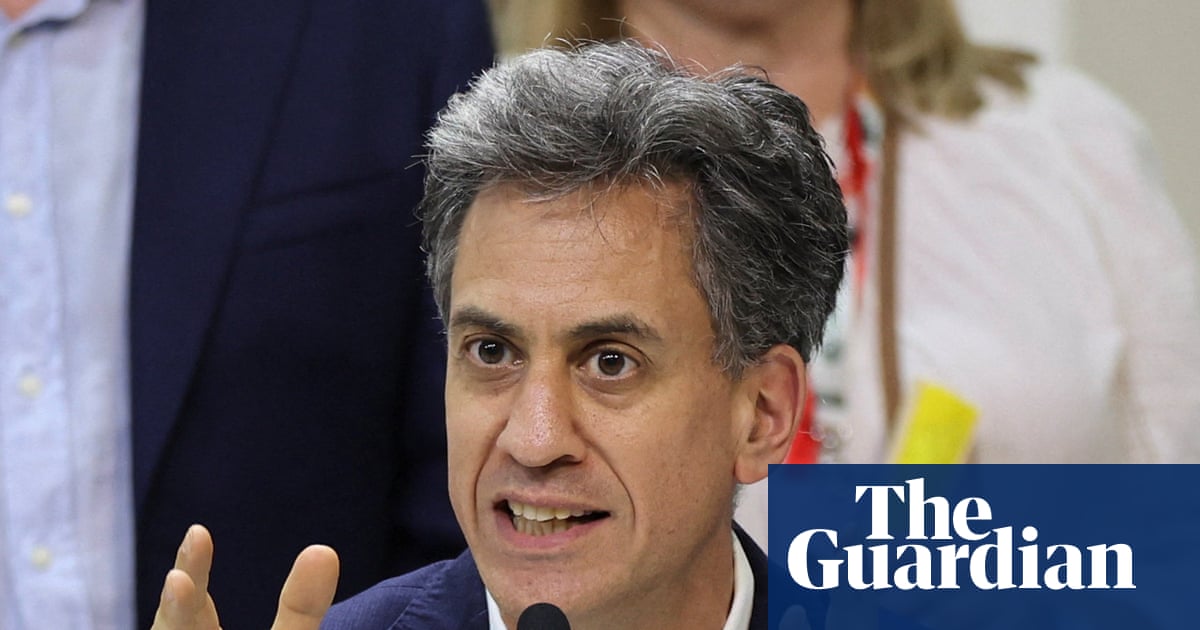
Supporters of a global phaseout of fossil fuels must find “creative” ways to keep the proposal alive, including making it voluntary rather than binding, the UK energy secretary, Ed Miliband, has said in the closing stages of the UN climate talks.
As the Cop30 summit in Brazil carried on past the Friday night deadline, the prospect of countries agreeing on the need for a roadmap to a global “transition away from fossil fuels” looked increasingly dim. A first draft of the potential outcome text from the summit had contained the formulation, but in the updated draft text produced on Friday by the Brazilian presidency it had been excised.
Miliband told the Guardian that “one way or another” there would be an outcome from the two-week summit that contained the pledge, but that it might be in an altered form, or could be a voluntary initiative rather than a binding commitment.
“We are fighting for the roadmap for the transition away from fossil fuels, and we’ve determined that one way or another we won’t lose the momentum [towards that outcome] that we’ve built at this Cop,” he said. “There’s a big coalition that wants this, of developing and developed countries.”
More than 80 countries, developed and developing, have backed the call for a roadmap to “transition away from fossil fuels”, but scores of countries are against it. The Arab Group, of which Saudi Arabia is the most prominent member, has led the opposition, but Russia, Bolivia, some African countries and some countries that are heavy consumers of fossil fuels have also rejected the wording.
Miliband said: “We need to think creatively about the possible ways in which we could get this roadmap process going. What matters to me is the outcome, that this roadmap gets launched, the countries can engage in it, and it gets to be considered by a Cop in the future. We’ve got a critical mass of countries that want that to happen. But there’s different ways of doing it. We’re looking at all of the creative ways in which that can happen.”
The EU was also urging countries behind the scenes to come out publicly in favour of the transition away from fossil fuels. Climate commissioner Wopke Hoekstra earlier on Friday called the text without the commitment “unacceptable”. He added: “Given that we’re so far away from where we should be, it’s unfortunate to say, but we’re really facing a no-deal situation.”
Some developing countries have been angered by the insistence on a phaseout. Richard Muyungi, envoy to the president of Tanzania, and current chair of the African Group of Nations, accused rich countries, including the EU, of holding the poor to ransom on the issue. He claimed that they were opposing Africa’s call for a tripling of the finance available to poor countries to help them adapt to the impacts of the climate crisis, to about $120bn (£92bn) a year, because some African countries would not back the fossil fuel roadmap.
“The phaseout of fossil fuels is not an African issue. We emit only 4% of total global emissions, and we have never discussed a phaseout. We have been discussing a phasedown,” he said. “Why are we being held to ransom? It’s like you are trading our lives with something we never caused. So they were saying, ‘If you do not accept a phaseout, we cannot give you the triple of adaptation.’ We said, ‘We cannot accept that.’”
Juan Carlos Monterrey, Panama’s special representative for climate change, had a different view. “What we have also seen is the EU are willing to engage constructively on adaptation finance. I have had direct conversations with them and the UK. But I also understand that we need more ambition [on cutting fossil fuel emissions] in the text for them to open up the chequebook a little bit more. The two go together,” he said.
The Guardian understands from various countries’ delegates that China is not among the countries blocking a fossil fuel phaseout roadmap, while India has taken a harder line by insisting developed countries bear responsibility for past greenhouse gas emissions.
after newsletter promotion
A few developing countries with fossil fuel interests, including Nigeria and Sierra Leone, have backed a potential roadmap.
Also at stake at Cop30 is the question of how countries respond to the fact that current national climate plans, known as nationally determined contributions, would lead to about 2.5C of heating above preindustrial levels, far above the 1.5C limit target set by the Paris agreement.
One delegate from the Alliance of Small Island States said the issue was critical to vulnerable countries, but the draft text contained only options to continue talking about the large gap between countries’ targets and the carbon cuts necessary to stay within 1.5C or as close to it as is now possible.
Leo Roberts of the E3G thinktank said: “Of course the best outcome is formal, universally agreed text setting out a country-led process which can map a route to phasing out fossil fuels. But even if that doesn’t make it into the final package, the signal from this Cop is clear – a big and growing number of countries recognise that a managed, collectively navigated route to fossil fuel phase-out is preferable to the chaotic absence of planning we currently have.”







